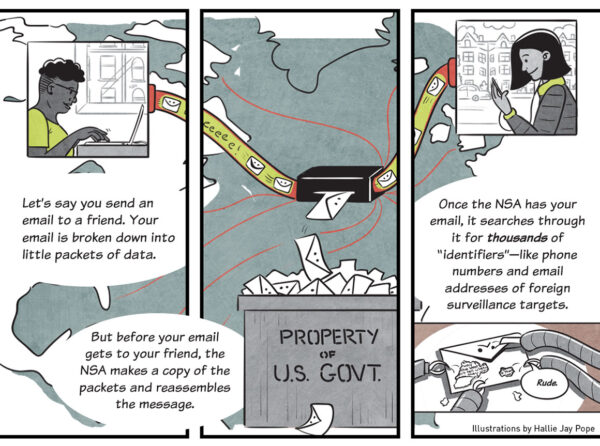ACLU Sues NSA to Stop Mass Internet Spying
Wikimedia, Rutherford Institute, Amnesty Among 9 Plaintiffs
BALTIMORE – The American Civil Liberties Union filed a major new lawsuit today on behalf of a broad group of organizations challenging the National Security Agency’s mass interception and searching of Americans’ international Internet communications, including emails, web-browsing content, and search-engine queries.
The plaintiffs are the Wikimedia Foundation, the conservative Rutherford Institute, The Nation magazine, Amnesty International USA, PEN American Center, Human Rights Watch, the National Association of Criminal Defense Lawyers, Global Fund for Women, and Washington Office on Latin America.
At issue is the NSA’s “upstream” surveillance, which involves the NSA’s tapping into the internet backbone inside the United States – the physical infrastructure that carries Americans’ online communications with each other and with the rest of the world. The NSA conducts this spying under a law called the FISA Amendments Act of 2008, which allows the agency to target the communications of foreigners abroad.
In the course of its surveillance, the NSA copies and combs through vast amounts of Internet traffic, which it intercepts inside the United States with the help of major telecommunications companies. It searches that traffic for keywords called “selectors” that are associated with its targets. The surveillance involves the NSA’s warrantless review of the emails and Internet activities of millions of ordinary Americans.
“This kind of dragnet surveillance constitutes a massive invasion of privacy, and it undermines the freedoms of expression and inquiry as well,” said ACLU Staff Attorney Patrick Toomey. “Ordinary Americans shouldn’t have to worry that the government is looking over their shoulders when they use the Internet.”
The lawsuit, filed in federal court in Maryland where the NSA is headquartered, argues that the NSA is violating the plaintiffs’ privacy rights under the Fourth Amendment and infringing on their First Amendment rights. The complaint also argues that upstream surveillance exceeds the authority granted by Congress under the FISA Amendments Act.
“By tapping the backbone of the Internet, the NSA is straining the backbone of democracy,” said Lila Tretikov, executive director of the Wikimedia Foundation, which operates Wikipedia, one of the most visited websites in the world. “Wikipedia is founded on the freedoms of expression, inquiry, and information. By violating our users’ privacy, the NSA is threatening the intellectual freedom that is a central to people’s ability to create and understand knowledge.”
The plaintiffs include human rights, legal, media, and information organizations whose work requires them to engage in sensitive communications with people outside the United States, such as colleagues, clients, journalists, and victims of human rights abuses. The lawsuit argues that upstream surveillance interferes with the groups’ abilities to do their jobs by violating the confidentiality of their communications and by making it more difficult to obtain crucial information from contacts and sources who communicate with them, often at significant personal risk.
The lawsuit is in some ways a successor to a previous ACLU lawsuit challenging the NSA’s warrantless wiretapping program, Clapper v. Amnesty. The Supreme Court dismissed that case in February 2013 in a 5-4 vote on the grounds that the plaintiffs could not prove that they had been spied on. Edward Snowden has said that the ruling contributed to his decision to expose certain aspects of the NSA’s surveillance activities a few months later.
Among the Snowden disclosures were documents relating to upstream surveillance, which has since been confirmed by the government. Unlike the surveillance considered by the Supreme Court in Clapper, upstream surveillance is not limited to the communications of NSA targets. Instead, as we have since learned, the NSA is searching the content of nearly all text-based Internet traffic entering or leaving the country – as well as many domestic communications – looking for thousands of keywords such as email addresses or phone numbers.
One of the NSA documents revealed by Snowden included a slide that named Wikipedia, among other major websites, as a good surveillance target for monitoring what people do on the Internet.
The new case is Wikimedia v. NSA. The attorneys are Toomey, Jameel Jaffer, Alex Abdo, and Ashley Gorski from the ACLU; David Rocah and Deborah Jeon from the ACLU of Maryland; and Charles Sims, David Munkittrick, and John Browning from the law firm Proskauer Rose LLP.
Today’s complaint is at:
https://www.aclu.org/national-security/wikimedia-v-nsa-complaint



